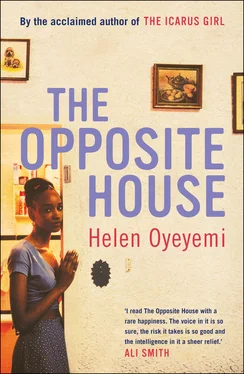Helen Oyeyemi - The Opposite House
Здесь есть возможность читать онлайн «Helen Oyeyemi - The Opposite House» весь текст электронной книги совершенно бесплатно (целиком полную версию без сокращений). В некоторых случаях можно слушать аудио, скачать через торрент в формате fb2 и присутствует краткое содержание. Год выпуска: 2008, Издательство: Bloomsbury UK, Жанр: Современная проза, на английском языке. Описание произведения, (предисловие) а так же отзывы посетителей доступны на портале библиотеки ЛибКат.
- Название:The Opposite House
- Автор:
- Издательство:Bloomsbury UK
- Жанр:
- Год:2008
- ISBN:нет данных
- Рейтинг книги:4 / 5. Голосов: 1
-
Избранное:Добавить в избранное
- Отзывы:
-
Ваша оценка:
- 80
- 1
- 2
- 3
- 4
- 5
The Opposite House: краткое содержание, описание и аннотация
Предлагаем к чтению аннотацию, описание, краткое содержание или предисловие (зависит от того, что написал сам автор книги «The Opposite House»). Если вы не нашли необходимую информацию о книге — напишите в комментариях, мы постараемся отыскать её.
The Opposite House — читать онлайн бесплатно полную книгу (весь текст) целиком
Ниже представлен текст книги, разбитый по страницам. Система сохранения места последней прочитанной страницы, позволяет с удобством читать онлайн бесплатно книгу «The Opposite House», без необходимости каждый раз заново искать на чём Вы остановились. Поставьте закладку, и сможете в любой момент перейти на страницу, на которой закончили чтение.
Интервал:
Закладка:
But before Tomás, when Papi, Chabella and I were in our Hamburg house, I was a sleepwalker. I went to bed with everyone else, fell asleep, tottered in circles around the house and woke up to the sound of early-morning bicycle bells and wheels soft-shooting over paved stone. I woke wherever I had dropped in exhaustion — curled in a ball under the kitchen table with my long nightie dragged down longer and wound around my numb feet.
Mami took the opportunity to ask me if we had rats; she thinks that a house at night is a kingdom of rats. I wasn’t in any position to notice rats. But when I started sleeping normally, I remembered that two silent girls had been there with me when I sleepwalked. They never let me go outside, never let me take down the bolts Chabella so fastidiously fastened every night. The girls detained me with their small, fuzzy selves, embraces, smiles, their scent; we played hide-and-seek, but they were always easy to find because they smelled of Chabella. They were completely bald, heads smooth and deep brown, small-boned faces with eye sockets like vast copper settings for their frozen amber eyes. They saw me, and their pupils dilated as if darkness had just fallen, as if I was their endarkenment.
Often the girls were wet, their clothes soaked through even when the weather outside was dry. I communicated to them about my son. I can’t remember who told what to whom. But I never said anything to my Mami about the girls — she would have had me exorcised or something. She keeps saying that when it came to being born, I was a difficult one to persuade. She miscarried twice, early in each pregnancy. When she told me about her miscarriages, I felt accused.
I said, ‘It’s not my fault,’ and Chabella shrugged.
I don’t know how long my son has been around, but I have been eating crap. Now the boy needs seeds and fresh fruit and oily fish and folic acid and carefulness and stuff. So I am disturbed when Chabella, my Mami, brings me a plastic bucketful of pineapples and half-ripe mangoes and unripe papaya. I don’t want to tell Chabella anything, but I think she knows something, and I sit as far away from her as possible so she can’t smell me. Chabella asks after Aaron, whom she loves and calls her moquenquen , her pikin , her heart child. Of Aaron Chabella says, ‘So handsome! And, praise God, he doesn’t know it!’
Aaron knows that one of Mami’s favourite singers is Melanie Safka. He bothers with Woodstock singing more than Papi or I or Tomás do; he gets the way that the singing never moves beyond the conversational, the way the music escapes through a percussion-tiled back door into a cry of care that is meant to find a softer sigh in answer. Like Mami, who listened before she knew what the words meant, he knows exactly when the lift in voice is going to happen and breathes out — ah — when it does.
To Chabella Aaron never forgets to murmur, ‘You’re beautiful people. You look like a friend of mine. I’m afraid we’ll never meet again…’
Chabella says, ‘You.’ She smiles like a sun brought down.
He tells her, ‘Don’t let it get to your head.’
But on this visit, Chabella just sits there and eyes me and drowns seven tablespoons of sweetener in milky tea. And she criticises my hair, which is now inexplicably seeping oil from beneath the bands and clips I’ve held it up with.
I have such a head of hair that Chabella had to put aside twice the time she needed for her own hair to sit down and grapple with mine. In Chabella’s hands my hair seemed tall, thick and mysterious; her fingers got lost in it as she struggled to relocate partings she’d made seconds before. I know that my friends from my sleepwalking days have something to do with all the hair I have.
And it was my hair that told me on Monday evening that something was different in my body. As I sectioned my hair and seized strands from the root to wrap them in cotton thread, my hair told me, No. It came away in my hands in soup-spoon curls. My hair has never had anything come between it and my system before. Mami never let me have my hair relaxed — the smell of hair chemicals makes her ill, and while this is probably true, it is also political.
Sugar makes Chabella sick too; she doesn’t even want to see it. It has to do with the year Castro called for Cubans to harvest ten million tons of sugar cane to pay off Cuba’s debt to Russia. Papi’s memories of that time are brief because they are bright — Papi, who knew just as little as Chabella does about sugar-cane farming, cheerfully tried to fulfil his quota, whistling, his tongue shifting coca leaves around his mouth while he worked.
Chabella is much younger than him, so she wasn’t there in the fields. But she has stories from her aunts who struggled amongst the leaves and cut themselves on sharp stubs left from poorly harvested cane. Sugar makes Chabella cry. She hints at other memories, other sugar horrors, ancestral. Since Chabella only bakes with sweeteners, Papi sometimes complains that the texture of her cucuruchos is different from that of the ones his mother used to make. But he doesn’t complain too loudly or persistently.
From Chabella I’ve learnt how to fight anyone, man or woman, whilst sitting down completely still. It’s all in the quality, not the quantity, of the tears; the soundless shudder as if the water comes from a deep place lined with rocks. When Mami gets sick, she cries like that, and the threat of that was enough for me not to bother with hair relaxers.
Chabella tried to teach me Gelassenheit — the longing to let go and collapse under holy madness — long before I read anything by Hans Denck. I drank Gelassenheit in by the litre at the kitchen table, where I sat on Mami’s lap and watched her twist rice paper into graceful shapes whose petals were melded together with fine honey. The prayer flowers were ships built to sail nowhere — set aflame they unreeled a bitter scent and carried the tiny pleas scribbled on their petals only as far as the limits of the glass bowl before they died.
Mami recited letters to me; they were from friends she had grown up with, friends who had spread out to Granma, Camaguey and Holguin. There were letters from her cousins in Villa Clara and Pinar del Rio, photographs and notes from her sister in Matanzas reminding her how lucky she was to be abroad, how lucky, querida , beloved, not to have to constantly pit yourself against la lucha , that struggle for life! The tone of the letters wasn’t envious, only kind. In other news, people were getting married, being born, people eloping with lovers to Santiago de Cuba and getting caught and told off and given family blessings. People were winning street-wide cooking contests for the best ropa vieja; people were ripping off hapless tourists. As Mami spoke her alien litany to me, she depressed the centres of each flower with a deft thumb so that each one could host a fire in its heart. Each petal read
ayude
She was asking for help.
But love gets in the way of her paper flowers, love keeps them secret from Papi. Chabella and Papi have ways of looking at each other, ways of touching that are full of stunned caution. They trip over each other constantly, marvel each time. When Mami sits down at the table, wiping her hands on her cooking skirt after she’s set dishes down before us, Papi takes her hand, strokes her fingers, says her name as if he’s asking it. Mami nods at him; her lips smile, her eyes smile. I grew up doubting that anyone would ever look at me in the same way. My doubt contains no great trauma; it’s casual, the way people doubt they can jump off a bridge and fly.
Papi taught at the university where Chabella was a student. He is twenty years older than Mami. And rare; they were rare, black academics in Cuba, black academics in a lot of places. I only know young-man-Papi from photographs. Young-man-Papi with his unkempt afro and tortoiseshell spectacles. Once he had finally, achingly understood that Castro’s Revolution was not his, Papi eschewed America — rather, after stints at the University of Hamburg and the Sorbonne, he brought Mami and I to London. Papi says he was ‘sent abroad by Castro’, as if Castro, having singled out the academics and bourgeoisie that he didn’t want in his revolution, had first restricted their research possibilities, then leant over and lifted them all airborne with a single puff.
Читать дальшеИнтервал:
Закладка:
Похожие книги на «The Opposite House»
Представляем Вашему вниманию похожие книги на «The Opposite House» списком для выбора. Мы отобрали схожую по названию и смыслу литературу в надежде предоставить читателям больше вариантов отыскать новые, интересные, ещё непрочитанные произведения.
Обсуждение, отзывы о книге «The Opposite House» и просто собственные мнения читателей. Оставьте ваши комментарии, напишите, что Вы думаете о произведении, его смысле или главных героях. Укажите что конкретно понравилось, а что нет, и почему Вы так считаете.












